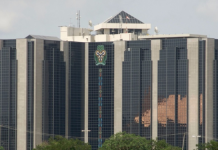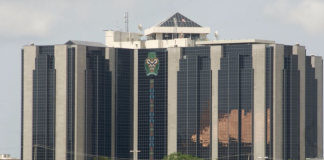Nigeria’s total public debt has soared to N121.67 trillion, marking a significant increase of N24.33 trillion, or 24.99 percent, within just three months, the Debt Management Office (DMO) announced on Thursday.
As of December 2023, the nation’s total debt stood at N97.34 trillion ($108.23 billion). However, by the end of March 2024, this figure had escalated to N121.67 trillion ($91.46 billion), a rise attributed largely to the depreciation of the naira and new borrowings.
The DMO detailed that the public debt encompasses both domestic and external debts of the Federal Government of Nigeria, the 36 state governments, and the Federal Capital Territory (FCT). The total domestic debt was recorded at N65.65 trillion ($46.29 billion), while total external debt was N56.02 trillion ($42.12 billion).
The naira’s depreciation played a major role in this increase, as the total debt, when converted to dollars, actually decreased by $16.77 billion, or 18.34 percent. The official exchange rate used by the DMO shifted from N899.39/$1 in December 2023 to N1,330/$1 in March 2024, reflecting the currency’s devaluation.
In addition to exchange rate impacts, the rise in debt was also fueled by new borrowings to partly finance the 2024 budget deficit and the securitization of a portion of the N7.3 trillion Ways and Means advances at the Central Bank of Nigeria.
The DMO’s statement clarified, “Excluding Naira exchange rate movements in Q1 2024, the domestic debt component alone grew from N59.12 trillion on December 31, 2023, to N65.65 trillion on March 31, 2024. This increase was driven by new borrowing to part-finance the 2024 budget deficit and securitization of a portion of the Ways and Means Advances.”
Furthermore, the 36 states and the FCT held an external debt of $3.1 billion and a domestic debt of N4.068 trillion.
In response to these developments, economic analysts have urged the Federal Government to utilize the expected $4.4 billion loan from the World Bank and the African Development Bank productively. Muda Yusuf, CEO of the Centre for the Promotion of Private Enterprise, emphasized the need for the loans to boost production capacities in key sectors such as agriculture to address critical issues like food inflation.
Similarly, Olusegun Ajibola, a Professor of Economics at Babcock University, recommended that the loans be tied to specific, monitorable sectors to ensure efficient utilization. He advised that only a minimal portion of the loans should be directed towards consumption needs.
However, concerns about the sustainability of Nigeria’s debt have been raised by experts like Olusola Obadimu, Director-General of the Nigerian Association of Chambers of Commerce, Industry, Mines and Agriculture. He criticized the government for exceeding its budget in relation to earnings, contributing to the weakening of the naira.
President Bola Tinubu has acknowledged the urgent need to reduce reliance on borrowing. He recently stated, “Can we continue to service external debts with 90 percent of our revenue? It is a path to destruction. It is not sustainable.”
Finance Minister Wale Edun has echoed this sentiment, emphasizing the need for fiscal discipline and reduced dependence on loans. However, the practical implementation of this strategy remains to be seen.
Bismarck Rewane, CEO of Financial Derivatives Company, highlighted in a report that Nigeria’s debt burden is becoming increasingly unsustainable, with the country using 99 percent of its revenue to service debt in the first half of 2023. He warned that high interest rates in 2024 would further exacerbate the debt burden, urging efficient use of borrowed funds to ensure debt sustainability and boost revenue sources.
Rewane cautioned that a one percent increase in public debt could negatively impact GDP by 16.7 percent, predicting that if public debt rises to $114.3 billion, real GDP growth could fall to 2.12 percent. Despite these challenges, he expressed confidence in Nigeria’s ability to withstand economic shocks.














